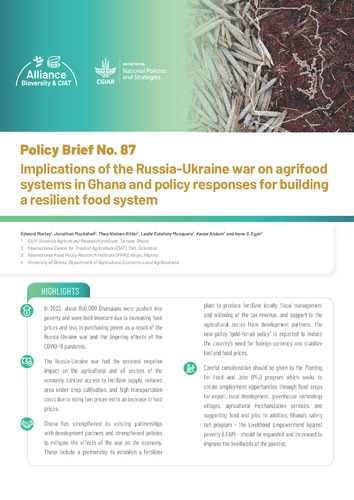Implications of the Russia-Ukraine war on agrifood systems in Ghana and policy responses for building a resilient food system
This policy brief discusses the immediate impact of the Russia-Ukraine war on the economy of Ghana with a specific focus on the agricultural and oil sectors. The study employs content analysis of various sources, including articles, published papers, and reports, and utilizes data from AfricaFertilizer.org, Ghana's Ministry of Food and Agriculture, and the World Food Programme (WFP) to explore these impacts and policy measures. The study finds that despite being a net crude oil exporter, Ghana's reliance on imports of petrol and diesel makes it susceptible to international price fluctuations, leading to rising pump prices and inflation. The war has also impacted Ghana's agricultural sector, particularly with regard to the import of chemical fertilizers for agricultural production. Furthermore, the study highlights the influence of the conflict on wheat exports and its consequences on Ghana's domestic wheat demand. Escalating palm oil, wheat, and fertilizer prices have further compounded the situation, with international price shocks affecting local food markets and contributing to high food inflation in Ghana. The document's scope extends to examining the policy responses implemented by the country's government to address the challenges posed by the conflict. Finally, the study concludes with key recommendations for enhancing the resilience of the food systems in Ghana.

